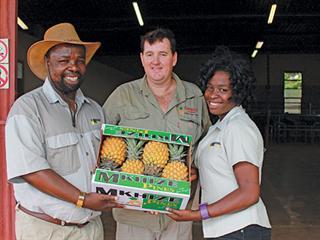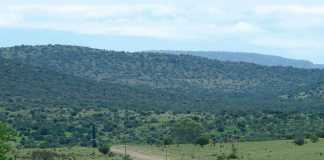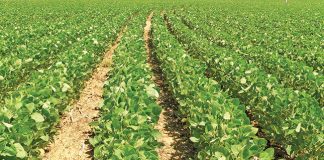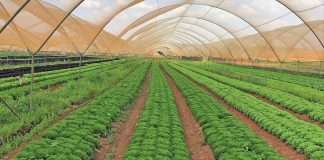
Hluhluwe’s queen pineapple industry has shrunk considerably from almost 50 farmers 20 years ago to only 11 farmers today. So when government granted Muntungani Mkhize a lease to a well-established commercial pineapple farm, he not only joined a rare breed, but did so as the local industry’s first black farmer. Muntungani, acting as a member of the nine-member Masithuthukigane Co-operative, signed a five-year lease with the Department of Rural Development and Land Reform (DRDLR) in September 2012, with an option to renew for another five years.
The government had purchased the 700ha pineapple and game farm from Gert van Rooyen. With farming experience limited to a small herd of cattle, Muntungani was fortunate to inherit an experienced team and to secure the services of a full-time mentor, Du Toit Visser. Du Toit’s father, Fred, owns the neighbouring pineapple farm, Gwanzi Queen Farming, and produces queen pineapples on 125ha.
“When new farmers come onto the land, it’s important that the staff stay on so that the processes, knowledge and experience are kept in the business. It’s also key that the mentor knows the whole process from planting to marketing well,” says Du Toit.
It is the first time that Muntungani’s 23-year-old daughter, Hlezi Mkhize, who is the farm manager, has worked on a farm.
“At first I was scared,” she admitted. “As the first black growers, we face a challenge because we have to work hard to prove that we can farm as well as white farmers. Gwanzi works as our partner and they manage our finances and oversee operations. The workers have also really helped us.”
Even so, it has not been easy going. Although DRDLR agreed to fund a five-phase development plan for Muntungani’s farm, it has been slow in distributing the promised funds on time. The first phase of funding, which was needed for inputs such as fertiliser, diesel, implements, tractors and wages, was released 12 months after Muntungani took over the farm. Had it not been for Gwanzi, Muntungani’s farm may already have folded.
Du Toit and Fred have made a personal and financial investment in their neighbour on a scale not often seen. While
Du Toit is hired by DRDLR as a full-time mentor, he has only been paid for four out of 14 months. Government also still owes Gwanzi about R200 000 for assets they purchased for Muntungani from the previous owner. And when Muntungani’s implements need work, they are repaired in Gwanzi’s workshop.
“When Muntungani took over, he had a crop in the field but no implements and no cash flow,” says Du Toit. “Gwanzi had to come to the party. For one year, we carried his costs, including wages, diesel and implements. We also bought second-hand assets for him from the previous owner to the value of about R200 000 and used our implements and tractors to plant his crop. He needed a headstart and we helped to the extent we could, keeping in mind that we needed to use our implements and tractors on our own farm as well.”
The implements could stretch only so far and Muntungani’s planting programme slowed down. As a result, from March to July, he will not have pineapples to harvest. He will only have fruit again in August, which will affect his cash flow. “Normally, we harvest pineapples 52 weeks of the year. Queen pineapples are first harvested 16 to 18 months after planting. After two years, the plants are uprooted and the soil is rested for 10 years. Apart from June and July, when we don’t plant because the soil temperature is too low, it is important to prevent gaps in the planting schedule, otherwise cash flow suffers,” explains Du Toit.
Phase 2 funding is now overdue, and because phase 1 funding was late, Muntungani will need to use these funds to settle debts incurred for production and input costs. This may result in a scenario where he experiences more production gaps in the future.
The farm, which trades as Mkhize Farming, has already been forced to reduce the area under production from 30ha to 25ha due to the delays experienced in the release of government funding.
“We try to stay positive and we keep planting. But we need phase 2 funding to buy a truck so I can get my fruit to market and fence the farm to protect valuable game roaming on the land from being poached,” says Muntungani. The funding will also
be used to increase pineapple plantings from 25ha to 50ha during the next two years. This is key to the long-term sustainability of the farm. Establishment costs are high at R105 000/ ha. Pineapples are input- and labour-intensive. Labour makes up 30% of all costs and fertiliser and diesel make up 21%.
Prices of queen pineapples vary between R40 and R50 per 8,5kg box. Marketing of the product makes up 40% of total expenditure, with transport and packaging accounting for 14% and 15% of total costs respectively. Boxes alone cost R6,50 each.
“Smaller farmers have dropped out of the industry because they cannot achieve economies of scale. But pineapple farming can be profitable if farmed intensively. If Muntungani extends to 50ha, and harvests 1ha/ week at 50t/ha, he has a profitable, self-sustainable enterprise and he won’t need external funding anymore,” says Du Toit.
Gwanzi is GlobalGap- certified and has built a reliable customer base over the years, supplying Shoprite Checkers, Woolworths, and international companies. “Our markets are growing and we’re expanding our own plantings, as well as buying in,” Du Toit says. Gwanzi purchases half of Mkhize Farming’s crop, with the other half being sent to the Durban, Johannesburg and Pretoria fresh produce markets. Undersized fruit is sent to Novapine in Hluhluwe for drying.
Du Toit says their commitment to their neighbour goes beyond that of a mentor. “I don’t want this farm to become just another farm that has failed. We have a high level of commitment and the Mkhizes are also keen to succeed. The soils and the location make this one of the best production sites in Hluhluwe.
Thobani Ngcobo, DRDLR communications manager in Richards Bay, acknowledged that the stringent procedures put in place to avert fraud and corruption had caused delays in releasing funds. However, he said the department had spent more than R4 million on production costs, electricity, management costs, office equipment, a vehicle, trailers and farming equipment on this project to date. He also said beneficiaries were advised that planning for agricultural processes should be done well ahead of implementation deadlines to allow internal processes to unfold timeously.
The department said the healthy relationship between Du Toit, Mkhize and the department had yielded positive results for the project. “We will do our best to advance the good intentions meant by the land reform programmes,” Ngcobo concluded.
Email Gwanzi Queen Farming at [email protected], phone 035 562 0408, or email Mkhize Farming at [email protected] or phone 035 562 0083.













